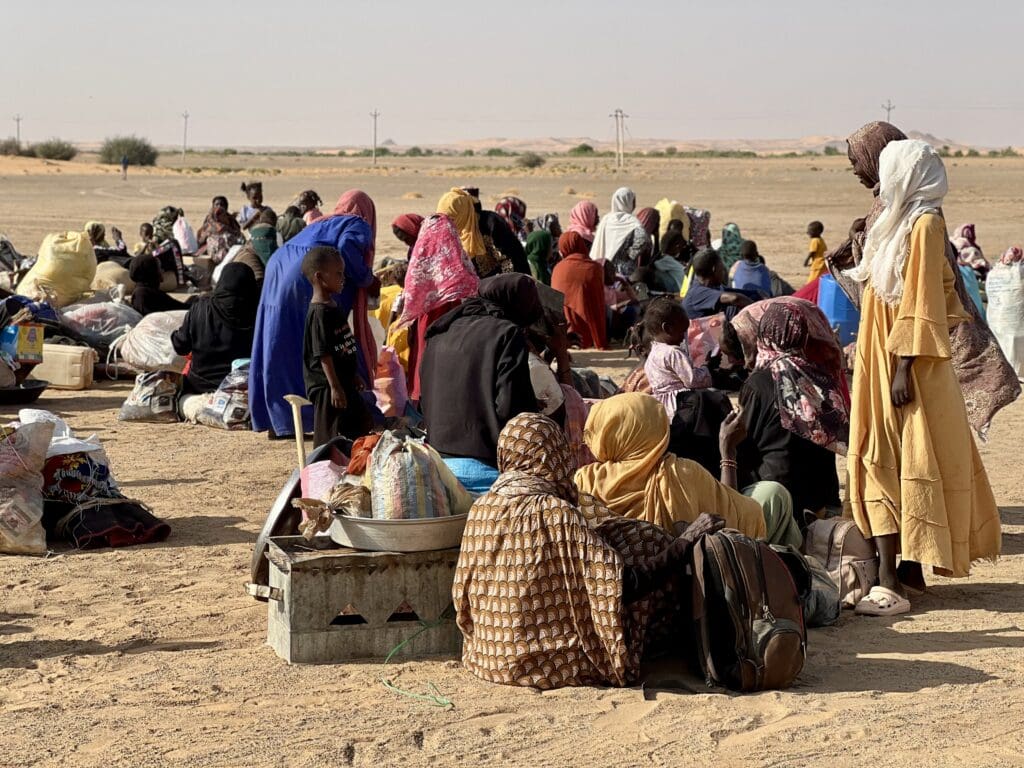The balance of power in Sudan’s war appears to be shifting, and with it has come a horrifying expansion of atrocities against the country’s long-suffering civilian population. On October 26, the paramilitary Rapid Support Forces (RSF) conquered the city of El Fasher, the capital of Darfur and the last stronghold of the Sudan Armed Forces (SAF) in the western region, after 18 months of siege.
Reports of grave war crimes have followed, including mass executions of captured soldiers, rapes, and attacks on civilians, humanitarian aid workers, and a hospital—much of it documented by RSF fighters themselves. Hundreds of thousands of people have fled immediately before and after the city’s fall, adding to the humanitarian catastrophe.
The RSF’s capture of El Fasher shifts the battlelines in Sudan eastward, toward Kordofan, leading to a further exodus of civilians and deepening of famine conditions. Yet it also comes amid renewed diplomatic efforts led by Washington and other key regional stakeholders to bring the fighting to an end, showcasing the failure to translate international negotiations into meaningful changes in their own policies or effective pressure on the ground.
Aspiration vs. Reality: The Quad Roadmap
In September, after months of negotiations, the Trump administration helped broker a document slated as a “roadmap” for peace in Sudan. Its signatories—the United States, Saudi Arabia, the United Arab Emirates, and Egypt—known collectively as the Quad, agreed to five principles to support an end to the conflict, including pushing for an immediate ceasefire and a nine-month transition to civilian rule.
Since then, the diplomacy has made no progress. Weeks after the roadmap was announced, the head of the Sudanese Armed Forces, General Abdel Fatah al-Burhan, dismissed the proposal as a “foreign agenda.” He insisted that a settlement must preserve the army’s authority and Sudan’s national institutions, effectively ruling out any transition that marginalizes the military. Burhan has demanded the outright dissolution of the RSF as a precondition for peace, and publicly disavowed negotiations except to “end the rebellion.”
Meanwhile, RSF commander General Mohamed “Hemedti” Dagalo intensified his offensive on El Fasher, showing little appetite for negotiations. RSF leaders have signaled that they do not trust the army to honor any deal and thus are demanding the dissolution and restructuring of the military institution. In essence, Hemedti’s camp is unwilling to lay down arms without guarantees that the SAF would not simply regroup—a stance reinforced by the RSF’s belief that it can still win militarily.
Just days before El Fasher fell, the U.S. convened SAF and RSF representatives for indirect talks ahead of another meeting of the Quartet.
The failure of diplomatic efforts is not only a result of intransigence from the parties on the ground. Despite an understanding outlined in the roadmap that “an end to external military support is essential to ending the conflict,” that support continues. Saudi Arabia and Egypt, fearful of the regional consequences of a fractured Sudan and mindful of tribal and religious dynamics, are trying to shore up the SAF as the last remaining national institution. The UAE, accused of clandestinely backing the RSF, has emphasized the need for political negotiations that would likely give the RSF a stake in Sudan’s future. UAE presidential adviser Anwar Gargash has urged “careful thought and realism,” insisting that only a negotiated transition can bring an end to the war.
As the continued fighting has led to “unspeakable atrocities” on the ground, the UAE has come under increasing pressure for its military support of the RSF—a charge it has repeatedly denied. A recently leaked United Nations produced last November documents “a consistent pattern…of cargo flights” transiting from the UAE to Chad, where there are multiple overland routes into neighboring Sudan. At least one senior U.S. senator has openly blamed the UAE in recent days for prolonging the crisis by secretly arming the militia.
Diplomatic actors are thus pulling in multiple directions. Cairo and Riyadh appear to be using the El Fasher crisis to press for security guarantees and a return to stability under a broad military-civilian administration that maintains a strong role for the military. Abu Dhabi is stressing the need for political negotiations with the RSF and its civilian allies, aligning with its regional strategic interests. Washington is focused on pushing a humanitarian truce, but critics argue it will be hard to achieve and even harder to enforce given the ongoing atrocities and the complex situation on the ground, as it has yet to enforce punitive measures on Hemedi’s inner circle and funders.
The Fallout
Since El Fasher’s fall and the accompanying carnage, external stakeholders have been scrambling for a diplomatic solution. Representatives of the Quartet convened in Washington the day after the city was seized by the RSF, apparently with input from the actors on the ground. The joint communique reaffirmed support for the September roadmap and announced a new coordination mechanism to press for a humanitarian truce, a longer-term ceasefire and cessation of external support on all sides. Yet the meeting’s outcome amounted to little more than restating common goals rather than escalating pressure on the combatants.
On October 3, the Trump administration’s envoy for Arab and African affairs, Massad Boulos, said Washington had proposed a new truce, the details of which have not been made public, and that the sides had agreed to it in principle, but will need to discuss details and implementation.
Since then, the RSF has agreed to the U.S. proposal but has continued with its attacks. Meanwhile, Sudan’s defense minister also welcomed U.S. peace efforts but said the army would press on with fighting the RSF. The military’s alliance with Darfuri armed groups and other factions appears to be driving a push for escalation. In addition, the widespread international condemnation of RSF atrocities in El Fasher strengthens the army’s position, allowing it to leverage global outrage to justify its continued resistance to the ceasefire.
The UN’s human rights chief called for “independent” investigations into the El-Fasher atrocities. Arab and Islamic partners, including Saudi Arabia, Türkiye and Qatar, publicly denounced the RSF’s killing spree, demanding restraint and unfettered aid access.
Despite renewed discussion, practical cooperation and responsiveness remain elusive. And none of the international condemnation has led to a withdrawal of RSF from urban areas, much less an end to civilian misery and fear. At the same time, reports indicate that RSF continues its advance in North Kordofan and Darfur, tightening the siege on towns such as Al-Obied and Babanusa in West Kordofan.
The Cost of Hesitation
Sudan’s battlefield has always been defined by asymmetries—between the regular army and militias, between well-armed capitals and isolated border towns. This time around, the RSF’s penchant for brutality and its military capabilities have magnified that gap. Yet any long-term solution will still depend on Sudan’s existing military infrastructure. The SAF—and its allied paramilitaries—remain, however flawed, the only national force capable of maintaining a semblance of order. If the government collapses entirely or is riven by mutinies, there is nothing ready to replace it except warring regional fiefdoms.
Moreover, every day the conflict grinds on, the prospects dim for any negotiated transition to civilian rule. The UN estimates that around 13 million Sudanese have now been displaced since the fighting began—roughly one-quarter of the population—and that famine or near-famine grips wide areas of Darfur, Kordofan and beyond. Any expectations that a quarter-year pause might allow quick recovery have faded; instead, the war’s arc is steering toward fragmentation.
Alarmingly, experts warn that if the RSF consolidates control in Darfur and pushes east into Kordofan, Sudan risks breaking apart along existing fault lines. Such a rupture would send shockwaves through the region: New refugee and smuggling routes could emerge into Chad, South Sudan, Libya and Egypt, straining border states and potentially destabilizing them. Egypt’s government, already on high alert after the RSF seized control of the triangle between Sudan and Libya, fears that rebel-backed incursions or mass migrations could impinge on Nile and national security. In other words, the costs of continued Quartet indecisiveness are dire: The moment may be near when the war will outpace any diplomatic process, and local tragedies will reverberate far beyond Sudan’s borders.
External patrons hold leverage; pulling back or coordinating their policies could pressure the RSF, but so far, they have not done so effectively. Continued foreign support for rival forces risks cementing a fait accompli on the ground—an outcome that could break up Sudan without any agreement at all. Ultimately, the International Quartet must translate its unified statements into concerted action before dynamics inside Sudan become irreversible.


